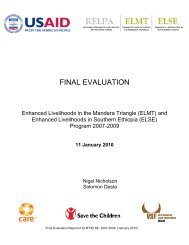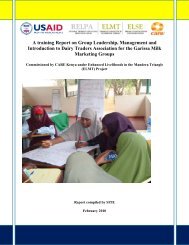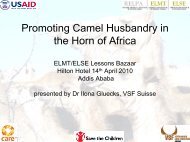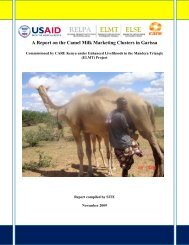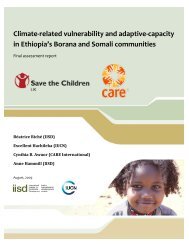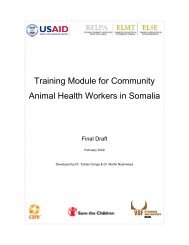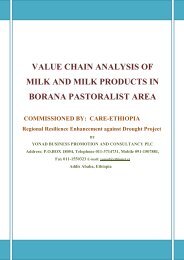care international in ethiopia – pastoral drop out study - ELMT Home
care international in ethiopia – pastoral drop out study - ELMT Home
care international in ethiopia – pastoral drop out study - ELMT Home
You also want an ePaper? Increase the reach of your titles
YUMPU automatically turns print PDFs into web optimized ePapers that Google loves.
quite exhaustive we obta<strong>in</strong>ed basic <strong>in</strong>formation through the KI on factors that forces people<br />
to leave the <strong>pastoral</strong> system and the preferred locational dest<strong>in</strong>ation of such people and the<br />
k<strong>in</strong>d of social groups they often jo<strong>in</strong> plus the most common livelihood strategies they<br />
pursue. Some ideas were also captured on the positive and negative impact of <strong>drop</strong><strong>out</strong>s on<br />
the environment and the society they left beh<strong>in</strong>d and the new social group they jo<strong>in</strong>. F<strong>in</strong>ally<br />
KI participants were asked to suggest on what needs to be done to help <strong>drop</strong><strong>out</strong>s to pursue<br />
susta<strong>in</strong>able livelihood strategies either <strong>in</strong> <strong>pastoral</strong> area or elsewhere. While conduct<strong>in</strong>g the KI<br />
trips were made to visit areas claimed to have large <strong>drop</strong><strong>out</strong> concentrations. Chollkass, Haro<br />
bake, Hidiale <strong>in</strong> Yabello; Dubluk and surround<strong>in</strong>g <strong>in</strong> Dire; and Shewaber, Maleb, and<br />
Chamuk <strong>in</strong> Moyale, were visited for field observation and <strong>in</strong>formal discussion with the<br />
<strong>drop</strong><strong>out</strong>s, and others who hosted them.<br />
The <strong>out</strong>come and prelim<strong>in</strong>ary <strong>in</strong>formation gathered through KI and the field observation to<br />
areas assumed to be concentration and attraction po<strong>in</strong>ts for <strong>drop</strong><strong>out</strong>s have guided the<br />
decision to select particular PAs for the FGD and household survey. Information gathered<br />
through KI revealed and confirmed the assumption on the geographical distribution,<br />
attraction po<strong>in</strong>ts and concentration areas of <strong>drop</strong><strong>out</strong>s.<br />
Focus Group Discussion<br />
PAs historically and currently known as po<strong>in</strong>t of attraction and areas of concentration for<br />
<strong>drop</strong><strong>out</strong>s as confirmed by the KI were selected to choose participants for the FGD. These<br />
areas exhibit unique characteristics such proximity to towns, markets, availability of suitable<br />
farmlands, center for food aid distributions, forest area for timber, woodland for fuel wood<br />
and charcoal burn<strong>in</strong>g, etc., which provide potential of alternative livelihood for people<br />
mov<strong>in</strong>g <strong>out</strong> of <strong>pastoral</strong>ism.<br />
We conducted six FGDs (3 <strong>in</strong> yabello, 2 <strong>in</strong> Dubluk and 1 <strong>in</strong> Moyale) for 3 different groups<br />
of people. Participants for five of the FGDs were selected systematically from the targeted<br />
areas, (2 yabello, 2 Dubluk and 1 moyale).<br />
18




